Editor’s Note: Climate change is not strictly an environmental issue. Many of the UConn@COP24 fellows took a human-centered approach to climate change and noticed the significant intersection between people and their environment. The blogs below detail their experiences and represent the diverse voices present at COP24.
Women’s Voices in Climate Negotiation – Jessica Weaver
Our climate is on fire and it’s time we all step up to put it out. – Adrienne Nguyen
Climate Change: The Faceless Genocide? – Sahil Lual
Youth Activism at COP24 – Emily Kaufman
Women’s Voices in Climate Negotiations
Jessica Weaver – Senior, B.S. Political Science
On my second day at COP24, I attended a side meeting regarding the intersection of gender and climate. The meeting was particularly focused on the progress of the Gender Action Plan and the Lime Work Programme. I learned about the steps that have been taken to provide “gender responsive” climate solutions that focus on helping women and girls adapt to climate change effects particularly with regards to water and agriculture resources.
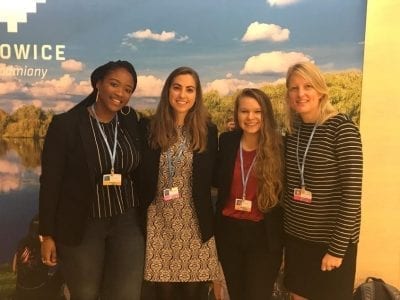
When the meeting commenced, delegates from Malawi and Costa Rica voiced concern over the lack of meetings between full delegation meetings. They asserted the need for funds for women and girls in the countries represented by the Least Developed Countries (LDC) Group because they are disproportionately dependent on climate-sensitive resources for their livelihoods.
I was able to view all of the interactions while sitting behind delegates from the United States. After the meeting closed, I asked the two delegates about their occupations and how they felt about the COP itself. Both worked in the Climate Office of the State Department and expressed their admiration for the large amount of students that were attending and participating in the dialogues that had already ensued. They also conveyed their satisfaction with the meeting proceedings and the importance of being a part of the negotiations to continue these projects into the coming years.
I thoroughly enjoyed the experience and am glad I was able to not only witness a glimpse of UNFCC proceedings, but also see a possible career avenue in the future. These negotiations are crucial not only for addressing the gender aspect of climate change, but for creating comprehensive dialogue for climate change solutions in COPs to come.
Our climate is on fire and it’s time we all step up to put it out.
By Adrienne Nguyen – Junior, B.S. Pathobiology and Molecular and Cellular Biology
Forest fires seem to be a hot topic these days. Especially because this year’s wildfire season has been the most destructive on record, internationally. Internationally. If you googled “2018 wildfires” the headlines are all about California. The wildfires alone in California emitted a year’s worth of power pollution. But what is happening at the other side of the world?
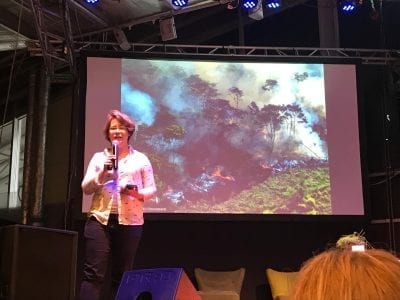
At the climate hub, I had the opportunity to listen to stories about the impact of forest fires on the climate from volunteers and leaders from Greenpeace. As we sat down in our seats, a man named Anton Beneslavskiy walked up on stage. A picture of black smoke clouds appeared on the screen. The slideshow progressed to aerial shots of forests engulfed in flames. He looked outside his window one morning in his city. The smog was so dense in the air that he could not see anything more than 50 ft away. In that moment, he knew something had to be done. He quit his career as a corporate lawyer and joined Greenpeace.
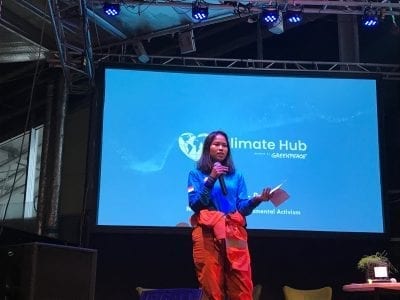
Another woman walked up on the stage. She was wearing a bright orange jumpsuit covered with smoke stains. The images of forest burning appeared on the screen again. In her 20s and standing about 5’3’’ tall, Larasati Wido Motovani, explained that she has suffered from upper respiratory diseases since she was a child. Lara’s from Indonesia and this year alone they’ve had countless wildfires. She glanced at the picture behind her and couldn’t speak. Tears started welling up at her eyes as she struggled to tell her story about how she leads groups of people to put out wildfires in her country.
These two leaders from Greenpeace are volunteer firefighters who changed their career paths to take action against climate change into their own hands. There is constant discussion on what needs to be changed, but most people are oblivious to the global effects. The California wildfires are arguably the most destructive climate related disasters this year but the attention has only been on them. This garnered aid from surrounding states and Canada to assist with putting out the fires. Yet, what about in Russia and Indonesia? And the rest of the world?
As I listened to their stories from a place of privilege, where I can breathe relatively smog free air in Connecticut, I now recognize that climate change action needs to be on the top of everyone’s priorities. Especially for those who may not face the immediate effects of climate change on a daily basis. We need everyone to start talking about climate change and bring the voices of those who are affected the most to the forefront.
Climate Change: The Faceless Genocide?
Sahil Lual – Senior, B.S. Molecular and Cellular Biology and Global Health
On the morning of December 2, 2018, we made a trip from the city of Kraków to the town of Oświęcim, best known for being home to Auschwitz Concentration Camp. Although I knew that touring the camp would be a sobering experience, I was not prepared for what ensued. As we exited the bus to enter the gates of Auschwitz-I, it was immediately clear that an unfathomable tragedy had occurred there. The air was cold, the sky grey, the tone somber, the landscape lifeless, and the emotion overwhelming. The three-and-a-half-hour tour of Auschwitz-I main camp and Auschwitz-II Birkenau camp not only revealed the ruthless crimes against humanity that had taken place there but contextualized the individual experiences of hundreds of thousands of Jews during one of humanity’s worst genocides. As we left the camp to return to Kraków several discussions followed; however, the most powerful one was the parallel between the Holocaust and climate change—an idea I had never considered. One student explained how the Holocaust was undoubtedly a crime against humanity with clear perpetrators; however, climate change, a change that causes hundreds of thousands of deaths a year, despite being understood to have anthropogenic origins, is often overlooked as the same.
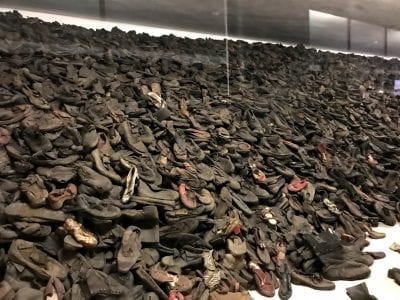
The following morning, we reconvened for our first breakfast club in preparation of our first day at the COP, and the conversation continued. Soon the parallels between the Holocaust and climate change became apparent prompting the question of why people are not held accountable for the same devastating loss of life. Research has clearly demonstrated the role of humans in the global rise of temperature, and it has been suggested that 200,000 deaths a year are linked to climate change, a number that will continue to rise as the earth warms. Yet, people, especially the CEOs of large companies and those with great political influence who contribute the most to climate change, are not implicated in the same way for the loss of life as Hitler and Nazi Germany were for the holocaust.
Why? Perhaps it is because the source of climate change cannot easily be pinpointed to a single person or group of people with a shared identity. Or maybe because we are still too naïve or ignorant and have not realized the truth about climate change—it is a faceless genocide. But if we do not realize this right now, it will be on us to repent to our children for the crimes we committed or idly allowed to be committed against humanity.
While thinking about this, I recalled learning about a Nazi resistance group called the White Rose. The White Rose consisted of German college students during the holocaust who realized that they as Germans would be held accountable for the incredible loss of lives from crimes being committed by Nazi Germans around them. Although the students were not Nazis, they understood that future generations would implicate them for the same crimes committed by the Nazis if they did not take action to stop it. As students, they had perspective and were able to mobilize a movement against Nazi Germany throughout Europe. Throughout my time at COP, one thing became clear: we as young people have the perspective and ability to catalyze change right now. And if we do not, it will be on us to answer to our children for the crimes we allowed to occur.
It is our time to act and as best stated in a biblical song by a slave:
“God gave Noah the rainbow sign. No more water, the fire next time!”
Youth Activism at COP24
Emily Kaufman – Sophomore, B.A. Environmental Studies and Sociology
The COP24 experience was one that came with inspiration, hope, but also frustration.
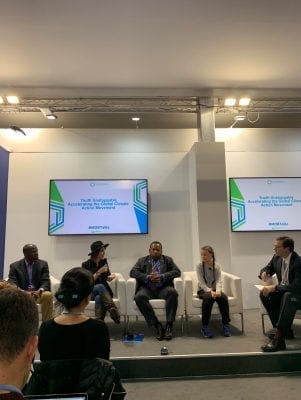
The first day that I had full access to the conference, I noticed that many of the events highlighted the “glamorous” messages that “renewables are cheaper and come with very few consequences” and that “a carbon tax will provide economic incentives and will pay itself off.” While, in hindsight, there is some truth to these messages, I found that many of these presentations failed to incorporate intersectionality and the humanity to these solutions.
In one panel about the myths of renewables, I found myself wondering if those praising this transition were considering those who have been working in the fossil fuel industry and will need to find another source of income. I had trouble accepting the fact that many people already being directly affected by climate change were reduced to statistics.
It wasn’t until I fell upon a panel about youth activism that I finally felt hope for meaningful systematic change. These panelists discussed the Talanoa dialogue, a term coined by the Fiji delegation in COP23, which recognizes the need to connect together as a global unit and share our stories in order to achieve our climate goals. As one panelist stated, “I have heard very few policy makers actually share their story.” The panelists stressed the importance of utilizing our creativity to create empathy, share stories, and internalize climate change issues.
I found this to be a refreshing take on the climate change movement—one that made me reconsider how we must tackle our impending world crisis.
I was so moved by this panel, that I started crying when I went up to thank the speakers for providing an often overlooked, but important perspective. The day after talking to these panelists, specifically to Jean Paul Brice Affana, a climate change activist, I was emailed and asked to speak on a panel to talk about intergenerational dialogues and youth activism.
This incredible opportunity made me recognize even more how important it is to make connections and share our stories with each other. If I had not reached out and shared how much their panel meant to me and connected to my passions, I would not have been able to have the opportunity to talk on a UN panel at COP24.
After this experience, I feel more confident about my pursuit of climate activism and inspired to share my story and fight for other stories to be heard. I am excited to become more of an activist on campus and hopefully empower others to make change.